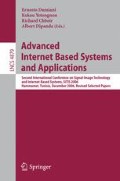Abstract
We are interested in protein classification based on their primary structures. The goal is to automatically classify proteins sequences according to their families. This task goes through the extraction of a set of descriptors that we present to the supervised learning algorithms. There are many types of descriptors used in the literature. The most popular one is the n-gram. It corresponds to a series of characters of n-length. The standard approach of the n-grams consists in setting first the parameter n, extracting the corresponding ngrams descriptors, and in working with this value during the whole data mining process. In this paper, we propose an hierarchical approach to the n-grams construction. The goal is to obtain descriptors of varying length for a better characterization of the protein families. This approach tries to answer to the domain knowledge of the biologists. The patterns, which characterize the proteins’ family, have most of the time a various length. Our idea is to transpose the frequent itemsets extraction principle, mainly used for the association rule mining, in the n-grams extraction for protein classification context. The experimentation shows that the new approach is consistent with the biological reality and has the same accuracy of the standard approach.
Access this chapter
Tax calculation will be finalised at checkout
Purchases are for personal use only
Preview
Unable to display preview. Download preview PDF.
References
Fayyad, U., Shapiro, G., Smyth, P.: From data mining to knowledge discovery: A overview. In: Advances in Knowledge Discovery and Data Mining, pp. 1–34. MIT Press, Cambridge (1996)
Gibas, C., Jambeck, P.: Introduction à la bioinformatique, Oreilly (2002)
Karplus, K., Barrett, C., Hughey, R.: Hidden Markov models for detecting remote protein homologies. Bioinformatics 14, 846–856 (1998)
Falquet, L., Pagni, M., Bucher, P., Hulo, N., Sigrist, C.J.A., Hofmann, K., Bairoch, A.: The PROSITE database, its status in 2002. Nucleic Acids Res. 30, 235–238 (2002)
Sebastiani, F.: Machine learning in automated text categorisation. ACM Survey 34(1), 1–47 (2002)
Mhamdi, F., Elloumi, M., Rakotomalala, R.: Textmining, features selection and datamining for proteins classification. In: IEEE/ICTTA 2004 (2004)
Mhamdi, F., Elloumi, M., Rakotomalala, R.: Desciptors Extraction for Proteins Classification. In: Proceeding of NCEI 2004, New Zealand (2004)
Lallich, S., Teytaud, O.: Évaluation et validation de l’intérêt des règles d’association, n°spécial Mesures de qualité pour la fouille des données, Revue des Nouvelles Technologies de l’Information, RNTI-E-1, 193–218 (2004)
Agrawal, R., Srikant, R.: Fast algorithms for mining association rules. In: Proceedings of the 20th VLDB Conference, Santiago, Chile (1994)
Murzin, G.A., Brenner, E.S., Hubbard, T., Chothia, C.: SCOP, a structural classification of proteins database for the investigation of sequences and structures. J. Mol. Bio. 247, 536–540 (1995)
Dietterich, T.: Approximate statistical tests for comparing supervised classification learning. Neural Computation journal 10(7), 1895–1924 (1999)
Rakotomalala, R., Mhamdi, F.: Évaluation des méthodes supervisées pour la discrimination de protéines. In: Dans le proceeding de la conférence SFC 2006, Metz (2006)
Cristianini, N., Shawe-Taylor, J.: An Introduction to Support Vector Machines and other kernel-base learning methods. Cambridge University Press, Cambridge (2000)
Eddy, S., Mitchison, G., Durbin, R.: Maximum discrimination hidden Markov models of sequences consensus. Journal of Computational Biology 2, 9–23 (1995)
Krogh, A., Brown, M., Mian, I.S., Sjolander, K., Haussler, D.: Hidden Markov models in computational biology: Applications to protein modeling. Journal of Molecular Biology 235(5), 1501–1531 (1994)
Vapnik, V.: The nature of statistical learning theory. Springer, Heidelberg
Guyon, I., Gupta, H.: An introduction to variable and feature selection. Journal of Machine Learning Reasearch, 157–1182 (2003)
Author information
Authors and Affiliations
Editor information
Editors and Affiliations
Rights and permissions
Copyright information
© 2009 Springer-Verlag Berlin Heidelberg
About this paper
Cite this paper
Mhamdi, F., Rakotomalala, R., Elloumi, M. (2009). A Hierarchical n-Grams Extraction Approach for Classification Problem. In: Damiani, E., Yetongnon, K., Chbeir, R., Dipanda, A. (eds) Advanced Internet Based Systems and Applications. SITIS 2006. Lecture Notes in Computer Science, vol 4879. Springer, Berlin, Heidelberg. https://doi.org/10.1007/978-3-642-01350-8_20
Download citation
DOI: https://doi.org/10.1007/978-3-642-01350-8_20
Publisher Name: Springer, Berlin, Heidelberg
Print ISBN: 978-3-642-01349-2
Online ISBN: 978-3-642-01350-8
eBook Packages: Computer ScienceComputer Science (R0)

